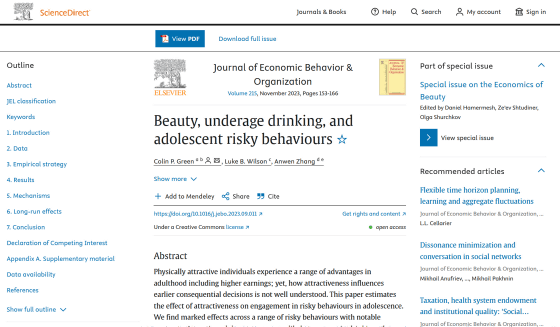'Good-looking teenagers' are more likely to drink alcohol than average teenagers

When we see young people who are attractive, we may feel that 'everything in life seems to be going well.' However, a new study that analyzed the relationship between the physical attractiveness and behavior of teenagers showed that 'young people who look good are at higher risk of drinking more alcohol.'
Beauty, underage drinking, and adolescent risky behaviors - ScienceDirect

The downside of being good looking
https://norwegianscitechnews.com/2024/06/the-downside-of-being-good-looking/
Attractiveness May Influence Teens' Tendency For Risky Behaviors : ScienceAlert
https://www.sciencealert.com/attractiveness-may-influence-teens-tendency-for-risky-behaviors
To investigate how 'physical attractiveness' affects risky behavior among young people, a research team from Norway, the UK, and other countries analyzed data from a longitudinal study conducted in the United States called the National Longitudinal Study of Adolescent to Adult Health (AD Health) .
Add Health is a longitudinal study that collected a wide range of demographic, social, family, economic, behavioral, psychological, cognitive, and health data from more than 30,000 adolescents who were in grades 7-12 in the United States in 1994-1995. Participants were followed continuously after leaving school, and responded to a variety of questions when they were adults, between the ages of 24-32.
Participants answered questions such as 'How much and how often did they drink alcohol in the past month?', 'Whether they binge drink?', 'Whether they smoke' and 'Whether they use other drugs?', and also provided information about casual sex and pregnancy.
Another unique feature of Add Health is that adult interviewers evaluate the attractiveness of young people. At the start of the study, the interviewers rated the attractiveness of the young people on a scale of 1 to 5. Of course, the evaluation of attractiveness is subjective, and most of the interviewers tended to be women. However, a meta-analysis in 2000 found that people did not differ significantly in what kind of faces they considered attractive, and the research team claims that the evaluation of attractiveness is 'useful and reliable.'

The results of the analysis showed that physically attractive young people tend to drink more frequently and in larger quantities than their less attractive counterparts. This trend was true for both men and women, but was especially true for physically attractive women.
In a follow-up study, the researchers found that the participants' drinking patterns as adults were similar to those they had as teenagers. Physically attractive women were more likely to develop drinking problems as adults than average-looking women, while physically unattractive men were less likely to develop drinking problems as adults.
'Our main finding is that young people who are perceived to have the most desirable appearances generally drink more and are more likely to drink heavily on several consecutive days,' said lead author Colin Green from

While the results showed that more physically attractive young people were more likely to drink alcohol, those who were rated as 'most attractive' were also less likely to smoke or use other drugs, or have casual sex.
The research team speculates that this result may be because drinking alcohol is more likely to be perceived as 'cool' among young people, while smoking, other drugs, and casual sex are seen as 'uncool,' and therefore less likely to be engaged in by popular teens.
'Young people may appear beautiful and successful, but they may also be carrying emotional burdens that undermine their confidence, such as an unstable home life or mental health issues. It's a dangerous combination,' Green said. She concluded that building self-esteem and confidence from an early age can help promote young people's health and prevent them from falling into unhappiness.
Related Posts:







